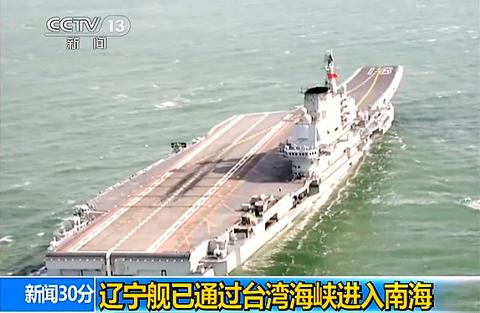The Ministry of National Defense yesterday confirmed that the Chinese aircraft carrier Liaoning passed through the Taiwan Strait yesterday morning — without crossing its median line — en route to the South China Sea, reiterating that the ministry had monitored the entire passage.
The voyage has drawn attention from Taiwan’s military and the international community amid rising tension over China’s demarcation of an air defense identification zone (ADIZ) in the East China Sea on Saturday.
Beijing’s East China Sea ADIZ overlaps with those of Japan, Taiwan and South Korea in a region marked by territorial disputes over the Diaoyutai Islands, claimed by Taiwan, China and Japan, and Ieodo, a South Korean-controlled submerged rock, which China also claims.

Photo: CNA
The carrier entered Taiwan’s ADIZ at about 10:30am on Wednesday and maintained a course approximately 14 nautical miles (26km) west of the median line of the Taiwan Strait before leaving Taiwan’s ADIZ at about 4am yesterday morning, ministry spokesman Major General David Lo (羅紹和) said.
“Taiwan’s surveillance and reconnaissance system, as well as several naval vessels and air force fighter jets, monitored the fleet’s entire passage through the Strait,” Lo said.
China’s Xinhua news agency reported early yesterday morning that the Liaoning, escorted by two guided missile destroyers, the Shenyang and Shijiazhuang, and two guided missile frigates, the Yantai and Weifang, had passed through the Strait on its way to a training mission in the South China Sea.
The voyage through the Strait took about 10 hours, the agency reported, adding that the Liaoning, China’s first and only aircraft carrier, left its home port of Qingdao in Shandong Province on Tuesday for a scientific and training mission.
The Liaoning, bought from Ukraine and refurbished in China, was commissioned last year and has been sent to the South China Sea for the first time.
Responding to the situation, Democratic Progressive Party Legislator Tsai Huang-liang (蔡煌瑯) yesterday urged President Ma Ying-jeou (馬英九) to lodge a protest with Beijing.
“Otherwise, the Taiwan Strait will become a Chinese inland sea in the future,” Tsai said, adding that Taiwan should side with its democratic allies over the situation.
Chinese Nationalist Party (KMT) Legislator Lin Yu-fang (林郁方) said China’s decision to send the carrier through the Taiwan Strait instead of cruising along Taiwan’s east coast hinted at Beijing’s backpedaling from its previously hawkish position on the ADIZ issue.

MORE VISITORS: The Tourism Administration said that it is seeing positive prospects in its efforts to expand the tourism market in North America and Europe Taiwan has been ranked as the cheapest place in the world to travel to this year, based on a list recommended by NerdWallet. The San Francisco-based personal finance company said that Taiwan topped the list of 16 nations it chose for budget travelers because US tourists do not need visas and travelers can easily have a good meal for less than US$10. A bus ride in Taipei costs just under US$0.50, while subway rides start at US$0.60, the firm said, adding that public transportation in Taiwan is easy to navigate. The firm also called Taiwan a “food lover’s paradise,” citing inexpensive breakfast stalls

TRADE: A mandatory declaration of origin for manufactured goods bound for the US is to take effect on May 7 to block China from exploiting Taiwan’s trade channels All products manufactured in Taiwan and exported to the US must include a signed declaration of origin starting on May 7, the Bureau of Foreign Trade announced yesterday. US President Donald Trump on April 2 imposed a 32 percent tariff on imports from Taiwan, but one week later announced a 90-day pause on its implementation. However, a universal 10 percent tariff was immediately applied to most imports from around the world. On April 12, the Trump administration further exempted computers, smartphones and semiconductors from the new tariffs. In response, President William Lai’s (賴清德) administration has introduced a series of countermeasures to support affected

CROSS-STRAIT: The vast majority of Taiwanese support maintaining the ‘status quo,’ while concern is rising about Beijing’s influence operations More than eight out of 10 Taiwanese reject Beijing’s “one country, two systems” framework for cross-strait relations, according to a survey released by the Mainland Affairs Council (MAC) on Thursday. The MAC’s latest quarterly survey found that 84.4 percent of respondents opposed Beijing’s “one country, two systems” formula for handling cross-strait relations — a figure consistent with past polling. Over the past three years, opposition to the framework has remained high, ranging from a low of 83.6 percent in April 2023 to a peak of 89.6 percent in April last year. In the most recent poll, 82.5 percent also rejected China’s

PLUGGING HOLES: The amendments would bring the legislation in line with systems found in other countries such as Japan and the US, Legislator Chen Kuan-ting said Democratic Progressive Party (DPP) Legislator Chen Kuan-ting (陳冠廷) has proposed amending national security legislation amid a spate of espionage cases. Potential gaps in security vetting procedures for personnel with access to sensitive information prompted him to propose the amendments, which would introduce changes to Article 14 of the Classified National Security Information Protection Act (國家機密保護法), Chen said yesterday. The proposal, which aims to enhance interagency vetting procedures and reduce the risk of classified information leaks, would establish a comprehensive security clearance system in Taiwan, he said. The amendment would require character and loyalty checks for civil servants and intelligence personnel prior to